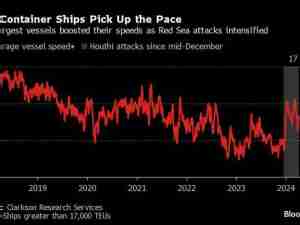In response to its worst heat wave since records began, Russia has imposed a grain export ban which is due to come into force on Sunday to restrain domestic food prices.
President Dmitry Medvedev said the ban could be lifted before its planned Dec. 31 expiry although Russian leaders have said it could be prolonged into 2011.
Ship brokers said there could be a build up in vessels in the short-term in the Black Sea area due to the export ban which may put pressure on freight rates.
"Some people are talking about cancellations out of the Black Sea which will put more vessels in the market but buyers will need to get grains from somewhere. So it should actually be positive for freight," said Petter Rishovd, a commodity broker with Pareto Securities.
Struggling with its own drought Ukraine is considering limiting combined exports of wheat and barley in the 2010/11 season, while the Customs Service has already blocked shipments from ports.
Shipping analysts said the majority of Russian and Ukrainian exports goes to markets in Africa and the Middle East.
"As Europe is also experiencing a poor harvest and will be unable to take up much of the slack, then we'd expect an increase in shipments to those areas from the U.S. in the near-term and then Latin America and Australia next year," said Will Fray, shipping analyst with consultants MSI.
Fray said sales from former Soviet Union countries accounted for around 15 percent of global world exports, adding a switch in trade patterns could be "significant."
"The effects of the above changes would provide a positive boost to shipping demand due to the net increase in distance covered by the fleet, which would positively impact panamax and handy vessels in particular," he said.
"This boost to demand from grain trade pattern changes provides another support to a market which we already see strengthening in Q4 -- more associated with quarterly pricing regimes in iron ore and coal, however, along with seasonal factors."
U.S. Push
"The ban on grain exports from Russia has also altered trade patterns, boosting demand for bulk carrier services," Nicolai Hansteen, chief economist with broker Lorentzen & Stemoco, said.
Shippers say a switch in origins to the United States, Australia and possibly Argentina would boost ton mile demand -- a key indicator of ship demand -- which measures the volume of cargo transported multiplied by the distance of the voyage.
"As we have seen more wheat fixtures from the U.S. Gulf, this development is an early boon for the U.S. grain export season," said Andrew Winkler, analyst with dry bulk consultants Commodore Research.
Winkler said as demand for U.S. grains increased ships would move into the area potentially creating a port congestion scenario witnessed in Brazil with the country's new sugar crop.
"As more ships leave from the Gulf to countries such as Egypt, tonne mile demand will also increase," he said. (Reuters)








